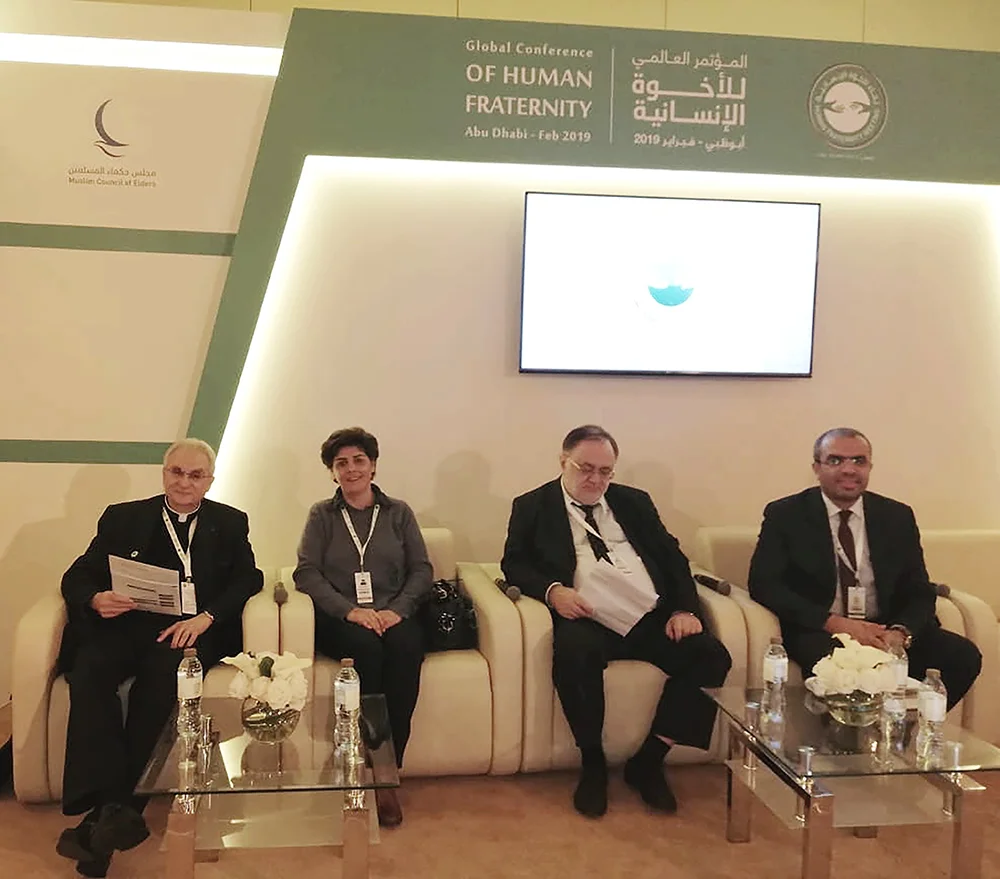MECC SG Dr Souraya Bechealany, on the International Conference for Human Fraternity – Abu Dhabi – UAE: “When Church Leaders Meet, This Heralds a Change in Extremist and Intolerant Mindsets”
The Middle East Council of Churches participated in the International Conference for Human Fraternity in Abu Dhabi in conjunction with the inaugural visit of His Holiness Pope Francis, the Pope of Peace, to the UAE for the spiritual Fraternity Meeting with the Muslim Council of Elders, headed by His Eminence the Grand Imam of Al Azhar, Sheikh Ahmed El-Tayeb, the Imam of Moderation.
In her intervention “Human Fraternity: Challenges and Opportunities” Dr. Bechealany inquired “What are the most important initiatives to be made by the religious leaders in order to find solutions for the worldwide international conflicts, which are based on misinterpreted or misunderstood religious references?”
Bechealany added: “We believe in the extreme importance of this initiative, for when Church leaders meet, this heralds a change in extremist and intolerant mindsets”. MECC believes in such effective and valuable initiatives, which are much appreciated. We would like to thank Dr. Sultan Faisal Al Remeithi, the new Secretary General of the Muslim Council of Elders for his keen invitation and constant support to shed the light on MECC’s ecumenical message.
We also congratulate the United Arab Emirates, in the person of His Highness Sheikh Khalifa bin Zayed Al Nahyan, Crown Prince of Abu Dhabi, for this spiritual conference that opens the Heaven’s door to look down at the concerns of our Arab World, torn apart by conflicts and wars in the name of religion, for decades now”.
“The Middle East Council of Churches is a regional religious organization that brings together the Churches of the Middle East to pray, reflect, and collaborate for the Human Dignity and Freedom. Founded in 1974, MECC has been working from the very start to establish the bounds of fraternity and the culture of tolerance, mutual respect and coexistence. These values have been implemented through several initiatives, some of which still exist. We mention two initiatives that should be followed to activate the culture of human fraternity. The first is a theological and religious education for the Middle East theology students, enhancing the culture of diversity in unity and dialogue, and tolerating the other’s particularities. MECC tries to activate this education through its association of Theological Institutes in the Middle East ATIME. This Association is a starting point to communicate with all the theological Institutes in the Middle East, similar to the KAICIID.
The second association which is based on building partnership with the International and Regional Organizations that deal with inclusive citizenship and religious freedom. The MECC is also partnering with ADYAN Foundation, KAICID, Wilton Park, The Forum for Promoting Peace in the Muslim Societies, and Sant’ Egidio.
I would like to give particular attention to the Wilton Park and the Forum for Promoting Peace in the Muslim Societies, as well as the Rachad Center for Cultural Governance that started from here, from Abu Dhabi, last November, to convert Human Fraternity and Inclusive Citizenship into Constitutions and Laws within the Arab societies, in order to protect the Human Right for citizenship, and religious freedom”.
Dr. Bechealany concluded: “MECC hopes that this conference will bring the fruits of the Spirit, so that fraternal love and Peace may find their way to the Middle East”.

